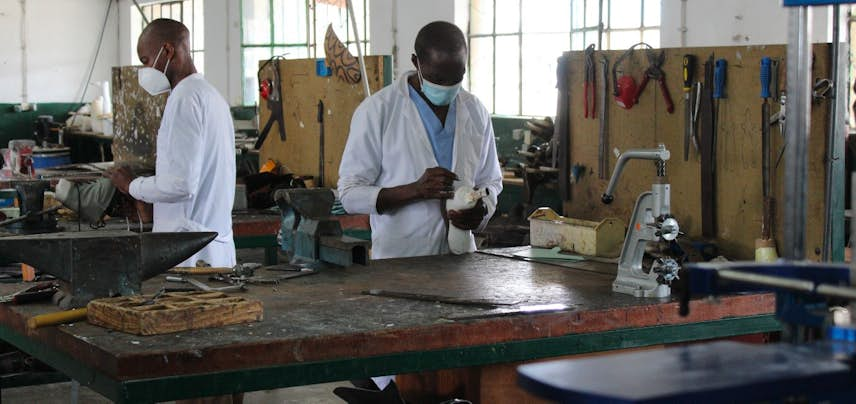Human rights
On the basis of this observation, respect for human rights is identified as one of the three cross-cutting priorities of Luxembourg Development Cooperation’s general strategy (“On the way to 2030”). Together with the other two cross-cutting priorities, gender equality and environmental sustainability, respect for and promotion of human rights are thus systematically taken into account in Luxembourg Development Cooperation and humanitarian interventions. In the framework of the implementation of its feminist foreign policy, Luxembourg has a particular commitment to promoting women’s rights as an integral part of human rights, as well as to increasing the representation and participation of women as the under-represented sex, at all levels of society.
In all its activities, Luxembourg Development Cooperation has boosted support for respect for international humanitarian law, human rights, the rule of law and access to justice, as well as support for the emergence of more effective and accountable public institutions. In order to ensure inclusive governance and the efficient and effective allocation of public resources in partner countries, Luxembourg Development Cooperation supports the conduct of sectoral and administrative reforms, deconcentration and decentralisation, as well as a stronger commitment to local partners. These actions are complemented by ongoing support to Luxembourgish and international NGOs in the area of human rights promotion. The aim is to promote the increased participation of civil society in decision-making processes, facilitate the establishment of an inclusive rights-based environment and protect individuals against arbitrary action by the state. Also, Luxembourg Development Cooperation and humanitarian action continued in 2021 to support access to and the provision of high-quality basic social services, in particular to the most vulnerable and marginalised population groups, including women and young people.
At the bilateral level, in order to respond to these priorities, the human rights situation in partner countries is addressed, inter alia, in the framework of structured dialogues on policy, but also systematically in the implementation of bilateral cooperation programmes. Luxembourg promotes a rights-based approach in all its current Indicative Cooperation Programmes. For example, the new Indicative Cooperation Programme between Luxembourg and Niger (ICP IV, 2022-2026), signed in May 2021, stresses that a human rights-based approach must be adopted throughout the cycle of ICP interventions, through systematic analysis of their potential implications for rights holders and those bound by obligations. Similarly, the interventions in the new Indicative Cooperation Programme between Luxembourg and Laos (ICP V, 2022-2026), signed in July 2021, will focus in particular on the promotion of and respect for human rights.
The issue of human rights is also being addressed in multilateral forums. Luxembourg is committed, through its development cooperation policy, to strengthening the capacities of human rights networks and organisations in developing countries. For example, from 6 to 8 December 2021, Franz Fayot travelled to New York for a working visit where he signed two new strategic partnership frameworks with UNICEF and with the United Nations Population Fund (UNFPA). UNICEF and UNFPA will benefit from a total financial envelope of approximately EUR 26 million, respectively, over a 4-year period (to 2025). The signing of the agreement with UNICEF coincides with the agency’s new strategic plan, which aims to contribute to the attainment of the SDGs and to establish a society in which every child is included and has agency, opportunity and their rights fulfilled. The new agreement with UNFPA will enable Luxembourg to strengthen a long-standing partnership and work closely with a competent and experienced body to ensure universal access to sexual and reproductive health and guaranteed reproductive rights and to reduce child mortality. Luxembourg Development Cooperation has also stepped up its collaboration with the Office of the United Nations High Commissioner for Human Rights (UNHCR). A contribution of EUR 500 000 was made to the UNHCR East Africa Regional Office, a second contribution of EUR 500 000 was transferred to the UNHCR Office in Myanmar and a third contribution of EUR 400 000 was made to the UNHCR fund for technical cooperation in the field of human rights, which provides technical assistance to states to help them develop their own national capacities in this area and to share good practices to promote the effective implementation of their human rights obligations.
In its collaboration with the private sector, Luxembourg Development Cooperation fully adheres to the United Nations guiding principles on business and human rights and the guidelines of the Organisation for Economic Co-operation and Development (OECD) to protect human rights and social development. In this context, Luxembourg Development Cooperation makes its support for private actors expressly conditional on their formal commitment to respect human rights. Indeed, compliance with the United Nations guiding principles on business and human rights is a criterion for evaluating the 2021 selection of the Business Partnership Facility. In its activities with private sector actors, Luxembourg Development Cooperation thus actively promotes conduct by businesses that respects human rights at every level of their value chain. The Directorate for Development Cooperation and Humanitarian Affairs has also actively participated in the work of the “Enterprises and Human Rights” working group and in the interministerial committee responsible for defining the broad guidelines on the duty of care for Luxembourg companies, and even preparing a position for negotiations in relation to a European directive in this field. This work, which is a concrete example of a strong commitment to policy coherence for development and the implementation of a human rights policy, will continue in 2022.
